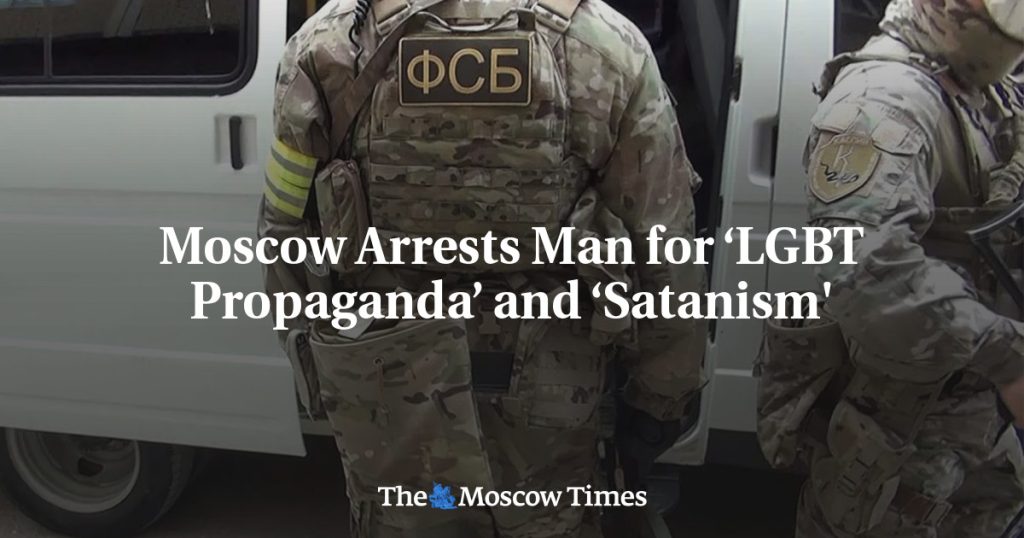Russia has intensified its legal crackdown on LGBTQ+ rights, with a recent arrest of a medic for “Satanism” and “promoting same-sex relationships.” The FSB security service arrested the head of a medical institution in the Ulyanovsk region, accusing him of devil worshiping and promoting the idea of same-sex relations among subordinate employees. The influence of the Orthodox Church has increased in Russia, leading to a conservative social turn and creating a hostile environment for LGBTQ+ individuals. The FSB also accused the man of misleading citizens into believing that adopting the cult was necessary for financial prosperity and career advancement, resulting in a criminal case being opened over coercion to engage in sexual acts and participate in an extremist organization.
The arrest of the medic in Russia is part of a broader crackdown on LGBTQ+ rights that has been accelerated by the country’s involvement in Ukraine. Russia has banned what it deems as the “international LGBT movement,” and ranks last in a European ranking of countries’ laws and policies impacting LGBTQ+ people. The legal environment in Russia has become increasingly hostile towards LGBTQ+ individuals, with state authorities making rare accusations against individuals for Satanism and promoting same-sex relationships. The FSB published a video of the man being arrested in his apartment by masked men in camouflage uniforms, highlighting the severity of the situation for LGBTQ+ rights in the country.
The arrest of the medic in Russia reflects a larger trend of the country moving towards more conservative social values. The Orthodox Church’s influence has steadily increased, leading to crackdowns on LGBTQ+ rights and freedoms. The FSB’s accusations against the medic indicate a belief that promoting same-sex relationships is seen as a threat to traditional family values and an extremist activity. The criminal case opened against the medic for coercion to engage in sexual acts and participation in an extremist organization showcases the state’s determination to suppress LGBTQ+ rights in the name of defending traditional family values.
Russia’s legal crackdown on LGBTQ+ rights comes at a time when the country is facing international criticism for its actions in Ukraine and increasingly authoritarian practices at home. The arrest of the medic for promoting same-sex relationships and Satanism is another example of the government’s intolerance towards LGBTQ+ individuals. The ban on the “international LGBT movement” and the country’s low ranking in European assessments of laws impacting LGBTQ+ people highlight the challenging environment for LGBTQ+ rights in Russia. The actions of the state authorities reflect a broader trend of conservative social values superseding individual freedoms and rights in the country.
The FSB’s arrest of the medic in Russia is a stark reminder of the challenges faced by the LGBTQ+ community in the country. The intimidation tactics used by masked men in military uniforms to arrest the medic underscore the severity of the situation for LGBTQ+ individuals. The criminal case opened against the medic for coercion to engage in sexual acts and extremism highlights the risks faced by those advocating for LGBTQ+ rights in Russia. The government’s crackdown on LGBTQ+ rights is part of a broader trend towards authoritarianism and conservative values, with the Orthodox Church playing an influential role in shaping social policies and attitudes towards LGBTQ+ individuals.
In the face of the challenges posed by the crackdown on LGBTQ+ rights in Russia, independent journalism plays a crucial role in shedding light on the situation. The Moscow Times, labeled as an “undesirable organization” and a “foreign agent” by Russian authorities, continues to strive to provide accurate and unbiased reporting on Russia. The organization faces risks of prosecution and censorship, but remains committed to defending open, independent journalism in the face of repression. Support from readers is essential to sustain the work of independent media outlets like The Moscow Times, which seek to provide a voice for marginalized communities and hold the authorities accountable for their actions.


